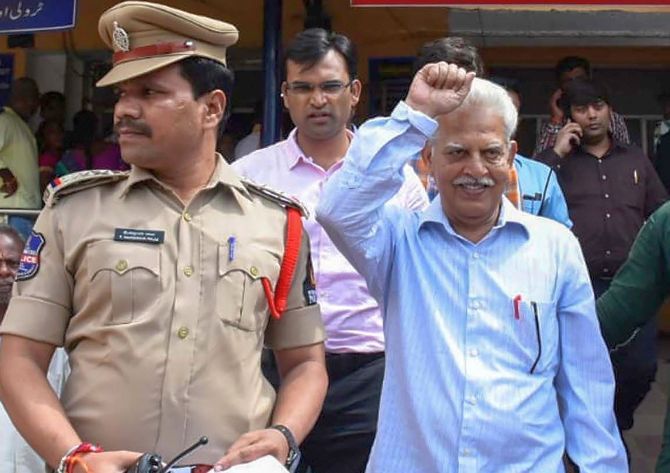'Ludicrous they might be, but they are not without threats -- much like letters that appear suddenly in homes of those opposing the government.'
'One must exercise some caution before believing in them,' says Uttaran Das Gupta.

Since the Maharashtra police revealed a Maoist plot to assassinate Prime Minister Narendra Damodardas Modi in a Rajiv Gandhi-type incident, of which they learnt from a letter, the number of such epistles seems to have multiplied like rabbits.
While the veracity of such letters is yet to be verified, they remind one of another such high-profile Naxalite case, that of Dr Binayak Sen.
For the uninitiated, Dr Sen, a Bengali paediatrician based in Chhattisgarh, was accused of having close links with Naxalites, and arrested and sentenced in a sedition case.
Among the evidence presented against him in court was an e-mail written by his wife, Illina Sen, to 'one Fernandes of the ISI'.
The Telegraph reported on December 17, 2010, the prosecution had argued that Dr and Ms Sen were members of an international terror ring and what could the ISI be but Pakistan's Inter-Services Intelligence?
Unhappily for the prosecution though, it turned out that the ISI in this case was the Indian Statistical Institute and 'Fernandes' was Walter Fernandes, its former head and friend of the Sens.
States are no strangers to being creators of fiction.
The current letters also reminded me of the most sensational conspiracy theory from the first half of the 20th century: The Protocols of the Elders of Zion.
The text, proven to be fabricated as early as 1921 by The Times of London, purported to be the minutes of a meeting in which senior Russian Jews planned global domination.
The earliest known edition of this text was published in Russia in 1903, right before anti-Jewish pogroms in the Russian empire, killing nearly 5,000 and forcing many to flee.
Some scholars such as Cesare De Michelis, professor of Russian literature at the University of Rome and an expert on the Protocols, have argued that those responsible for the forgery could be directly linked to initiating the anti-Semitic riots.
To misquote Shashi Tharoor, this 'farrago of fiction and hoaxes' forms the cornerstone of Umberto Eco's remarkable novel, The Prague Cemetery (2011).
Eco has claimed elsewhere that the novel has little invention and mostly history. He does invent a fictional forger, Simone Simonini, whom a New York Times critic describes as the Forrest Gump of evil, 'always present where the action is'.
Fed on stories of a Jewish bogeyman by his anti-Semitic grandfather, Simonini grows up to be a professional forger suffering from a split personality. He is the only fiction in Eco's novel; almost everything else is fact.
The Protocols, in real life and also in Eco's novel, was plagiarised from a variety of sources, and the labyrinth of hoaxes is sometimes impossible to negotiate without getting completely lost. A primary source is an 1864 political pamphlet satirising Napoleon III, which landed its author, Maurice Joly, in jail for 15 months.
Apparently two-fifths of the Protocols are copy-pasted from Joly's work, which in turn was heavily inspired by Eugène Sue's popular novel The Mysteries of a People. In it, the villains are Jesuits. So where are the Jews?
They were introduced by French cleric Augustin Barruel, a sort of master of conspiracy theories who had earlier claimed that Freemasons had orchestrated the French Revolution.
If you think this is too much, hold on: Barruel's falsification was expanded upon by novelist Hermann Goedsche, a Prussian agent, who included a chapter in his novel Biarritz (1868) about a Jewish cemetery in Prague.
This chapter had a life independent of the novel, and was widely circulated in Europe. After its translation into Russian, it became another source for the Protocols.
This wildly popular false document would become a favourite with none other than Adolf Hitler.
Professor Randall L Bytwerk, in his essay 'Believing in Inner Truth', claims that though most senior Nazis knew that the Protocols was a spurious document, they nevertheless happily used it for propaganda.
In Mein Kampf, Hitler writes: 'They are based on a forgery, the Frankfurter Zeitung moans and screams once every week: The best proof that they are authentic.'
Sounds familiar to current global leaders calling the established media liars?
The Nazi party's official publishing house, Eher Verlag, had published a German version of the Protocols in 1920. By 1933, it had been reprinted 13 times, and Der Schulungsbrief reviewed it in 1937, claiming: 'He who knows The Protocols of the Elders of Zion understands why Jewry uses every lying method to dispute the genuineness of these protocols. Jewry's ruthless drive for world domination was stopped only by National Socialism.'
During the famous Bern trials, the Nazi party's propaganda machinery projected the attack on the veracity of the Protocols as an international Jewish conspiracy.
Even now, neo-Nazis often use the Protocols on their Web sites for propaganda.
In a 2002 article, Eco claimed: 'It is enough to visit certain racist Webs ites, or to follow anti-Zionist propaganda in the Arab countries, to see that anti-semites have still found nothing better to do than to recycle, yet again, those ludicrous Protocols.'
Ludicrous they might be, but they are not without threats -- much like letters that appear suddenly in homes of those opposing the government.
One must exercise some caution before believing in them.











